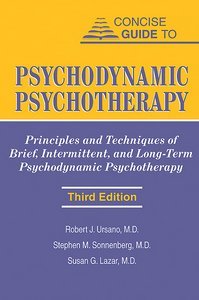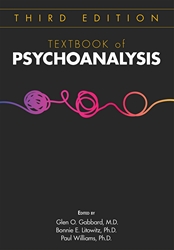Concise Guide to Psychodynamic Psychotherapy, Third Edition
Principles and Techniques of Brief, Intermittent, and Long-Term Psychodynamic Psychotherapy
View Pricing
Description
Developing skills in psychodynamic psychotherapy and its techniques is a lifetime endeavor. The third edition of this volume from American Psychiatric Publishing's enduringly popular Concise Guides series serves as an excellent starting point for mastering these vital skills—skills that can be applied to many other psychiatric treatment modalities, including other psychotherapies, medication management, consultation-liaison psychiatry, outpatient and emergency room assessment and evaluation, and inpatient treatment.
In a compact guide—complete with glossary, indexes, tables, charts, and relevant references—designed to fit into a lab coat pocket, the authors
- Provide the clinician with an updated introduction to the concepts and techniques of psychodynamic psychotherapy, describing their usefulness in other treatments. For example, psychodynamic listening and psychodynamic evaluation are best learned in the context of psychodynamic psychotherapy training but are applicable in many other psychiatric diagnostic and treatment methods.
- Convey the excitement and usefulness—as well as the difficulties—of psychodynamic psychotherapy and its techniques, including case examples.
- Show the efficacy and cost-effectiveness of psychotherapy in general, and of psychodynamic psychotherapy in particular—issues of special importance in the evidence-based practice of medicine and mental health care.
- Explain the advantages—and limitations—of each form of psychodynamic psychotherapy: brief, long-term, and intermittent. For example, psychotherapists must be able to recognize patterns of interpersonal interaction without engaging in the drama. Thus, they must learn to recognize and understand their own reactions as early indicators of events transpiring in the treatment and as potential roadblocks to a successful treatment.
Complementing more detailed, lengthier psychiatry texts, this volume's 15 densely informative chapters cover everything from basic principles to patient evaluation, resistance and defense, transference and countertransference, dreams, beginning and termination of treatment, management of practical problems, brief and supportive psychotherapy, and psychotherapy of borderline personality disorder and other severe character pathologies.
Mental health care professionals everywhere will turn to this practical guide again and again as an invaluable resource in creating and implementing effective treatment plans for their patients.
Contents
- About the Authors
- Introduction to the Concise Guides Series
- Preface to the Third Edition
- Chapter 1. Why Psychotherapy?
- Chapter 2. Basic Principles
- Chapter 3. Patient Evaluation, I: Assessment, Diagnosis, and the Prescription of Psychotherapy
- Chapter 4. Patient Evaluation, II: Psychodynamic Listening
- Chapter 5. Patient Evaluation, III: Psychodynamic Evaluation
- Chapter 6. Beginning Treatment
- Chapter 7. Resistance and Defense
- Chapter 8. Transference
- Chapter 9. Countertransference
- Chapter 10. Dreams
- Chapter 11. Termination
- Chapter 12. Practical Problems and Their Management
- Chapter 13. Brief Psychotherapy
- Chapter 14. Psychotherapy for Borderline Personality Disorder and Other Severe Character Pathology
- Chapter 15. Supportive Psychotherapy
- Appendix: A Brief History of Psychodynamic Psychotherapy
- Glossary
- Author Index
- Subject Index
About the Authors
Robert J. Ursano, M.D., is Professor and Chairman of the Department of Psychiatry at the Uniformed Services University of the Health Sciences, F. Edward Hebert School of Medicine, in Bethesda, Maryland. He is also on the teaching faculty of the Washington Psychoanalytic Institute in Washington, D.C.
Stephen M. Sonnenberg, M.D., is Adjunct Professor in the Department of Psychiatry at the Uniformed Services University of the Health Sciences, F. Edward Hebert School of Medicine, in Bethesda, Maryland, and Clinical Professor in the Department of Psychiatry, Baylor College of Medicine, Houston, Texas. He is also a Training and Supervising Analyst at the Houston-Galveston Psychoanalytic Institute, based in Austin, Texas.
Susan G. Lazar, M.D., is an Adjunct Professor in the Department of Psychiatry at the Uniformed Services University of the Health Sciences, F. Edward Hebert School of Medicine, in Bethesda, Maryland, and at the George Washington University School of Medicine, Washington, D.C. She is also a Training and Supervising Analyst at the Washington Psychoanalytic Institute in Washington, D.C.
Related Products
Carousel Control - items will scroll by tabbing through them, otherwise arrows can be used to scroll one item at a time








